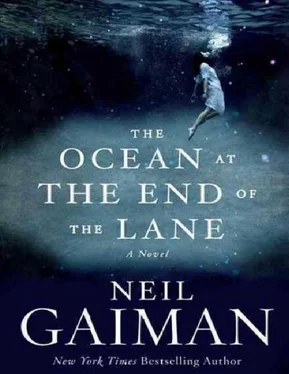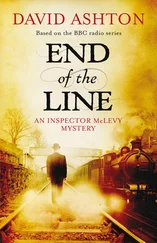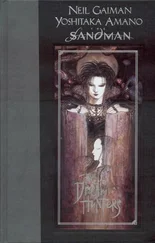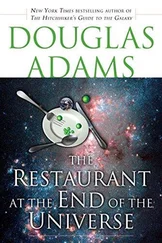She rubbed her freckled nose with a grubby hand.
“A lady’s gone mad in that house,” she told me, and it would not have occurred to me to doubt her. “She has money in the mattress. Now she won’t get out of bed, in case someone takes it from her.” “How do you know?”
She shrugged. “Once you’ve been around for a bit, you get to know stuff.”
I kicked a stone. “By ‘a bit’ do you mean ‘a really long time’?”
She nodded.
“How old are you, really?” I asked.
“Eleven.”
I thought for a bit. Then I asked, “How long have you been eleven for?”
She smiled at me.
We walked past Caraway Farm The farmers, whom one day I would come to know as Callie Anders’s parents, were standing in their farmyard, shouting at each other. They stopped when they saw us.
When we rounded a bend in the lane, and were out of sight, Lettie said, “Those poor people.” “Why are they poor people?”
“Because they’ve been having money problems. And this morning he had a dream where she . . .
she was doing bad things. To earn money. So he looked in her handbag and found lots of folded-up ten-shilling notes. She says she doesn’t know where they came from, and he doesn’t believe her. He doesn’t know what to believe.”
“All the fighting and the dreams. It’s about money, isn’t it?”
“I’m not sure,” said Lettie, and she seemed so grown-up then that I was almost scared of her. “Whatever’s happening,” she said, eventually, “it can all be sorted out.” She saw the expression on my face then, worried. Scared even. And she said, “After pancakes.”
Lettie cooked us pancakes on a big metal griddle, on the kitchen stove. They were paper-thin, and as each pancake was done Lettie would squeeze lemon onto it, and plop a blob of plum jam into the center, and roll it tightly, like a cigar. When there were enough we sat at the kitchen table and wolfed them down.
There was a hearth in that kitchen, and there were ashes still smoldering in the hearth, from the night before. That kitchen was a friendly place, I thought.
I said to Lettie, “I’m scared.”
She smiled at me. “I’ll make sure you’re safe. I promise. I’m not scared.”
I was still scared, but not as much. “It’s just scary.”
“I said I promise,” said Lettie Hempstock. “I won’t let you be hurt.”
“Hurt?” said a high, cracked voice. “Who’s hurt? What’s been hurt? Why would anybody be hurt?”
It was Old Mrs. Hempstock, her apron held betweenher hands, and in the hollow of the apron so many daffodils that the light reflected up from them transformed her face to gold, and the kitchen seemed bathed in yellow light.
Lettie said, “Something’s causing trouble. It’s giving people money. In their dreams and in real life.” She showed the old lady my shilling. “My friend found himself choking on this shilling when he woke up this morning.”
Old Mrs. Hempstock put her apron on the kitchen table, rapidly moved the daffodils off the cloth and onto the wood. Then she took the shilling from Lettie. She squinted at it, sniffed it, rubbed at it, listened to it (or put it to her ear, at any rate), then touched it with the tip of her purple tongue.
“It’s new,” she said, at last. “It says 1912 on it, but it didn’t exist yesterday.”
Lettie said, “I knew there was something funny about it.”
I looked up at Old Mrs. Hempstock. “How do you know?”
“Good question, luvvie. It’s electron decay, mostly. You have to look at things closely to see the electrons. They’re the little dinky ones that look like tiny smiles. The neutrons are the gray ones that look like frowns. The electrons were all a bit too smiley for 1912, so then I checked the sides of the letters and the old king’s head, and everything was a tad too crisp and sharp. Even where they were worn, it was as if they’d been made to be worn.”
“You must have very good eyesight,” I told her. I was impressed. She gave me back the coin.
“Not as good as it once was, but then, when you get to be my age, your eyesight won’t be as sharp as it once was, neither.” And she let out a guffaw as if she had said something very funny.
“How old is that?”
Lettie looked at me, and I was worried that I’d said something rude. Sometimes adults didn’t like to be asked their ages, and sometimes they did. In my experience, old people did. They were proud ol their ages. Mrs. Wollery was seventy-seven, and Mr. Wollery was eighty-nine, and they liked telling us how old they were.
Old Mrs. Hempstock went over to a cupboard, and took out several colorful vases. “Old enough,” she said. “I remember when the moon was made.”
“Hasn’t there always been a moon?”
“Bless you. Not in the slightest. I remember the day the moon came. We looked up in the sky—it was all dirty brown and sooty gray here then, not green and blue . . .” She half-filled each of the vases at the sink. Then she took a pair of blackened kitchen scissors, and snipped off the bottom half-inch of stem from each of the daffodils.
I said, “Are you sure it’s not that man’s ghost doing this? Are you sure we aren’t being haunted?” They both laughed then, the girl and the old woman, and I felt stupid. I said, “Sorry.”
“Ghosts can’t make things,” said Lettie. “They aren’t even good at moving things.”
Old Mrs. Hempstock said, “Go and get your mother. She’s doing laundry.” Then, to me, “You shall help me with the daffs.”
I helped her put the flowers into the vases, and she asked my opinion on where to put the vases in the kitchen. We placed the vases where I suggested, and I felt wonderfully important.
The daffodils sat like patches of sunlight, making that dark wooden kitchen even more cheerful. The floor was made of red and gray flagstones. The walls were whitewashed.
The old woman gave me a lump of honeycomb, from the Hempstocks’ own beehive, on a chipped saucer, and poured a little cream over it from a jug. I ate it with a spoon, chewing the wax like gum, letting the honey flow into my mouth, sweet and sticky with an aftertaste of wildflowers.
I was scraping the last of the cream and honey from the saucer when Lettie and her mother came into the kitchen. Mrs. Hempstock still had big Wellington boots on, and she strode in as if she were in an enormous hurry. “Mother!” she said. “Giving the boy honey. You’ll rot his teeth.”
Old Mrs. Hempstock shrugged. “I’ll have a word withthe wigglers in his mouth,” she said. “Get them to leave his teeth alone.”
“You can’t just boss bacteria around like that,” said the younger Mrs. Hempstock. “They don’t like
it.”
“Stuff and silliness,” said the old lady. “You leave wigglers alone and they’ll be carrying on like anything. Show them who’s boss and they can’t do enough for you. You’ve tasted my cheese.” She turned to me. “I’ve won medals for my cheese. Medals. Back in the old king’s day there were those who’d ride for a week to buy a round of my cheese. They said that the king himself had it with his bread and his boys, Prince Dickon and Prince Geoffrey and even little Prince John, they swore it was the finest cheese they had ever tasted—”
“Gran,” said Lettie, and the old lady stopped, mid-flow.
Lettie’s mother said, “You’ll be needing a hazel wand. And,” she added, somewhat doubtfully, “I suppose you could take the lad. It’s his coin, and it’ll be easier to carry if he’s with you. Something she made.”
“She?” said Lettie.
She was holding her horn-handled penknife, with the blade closed.
“Tastes like a she,” said Lettie’s mother. “I might be wrong, mind.”
Читать дальше












